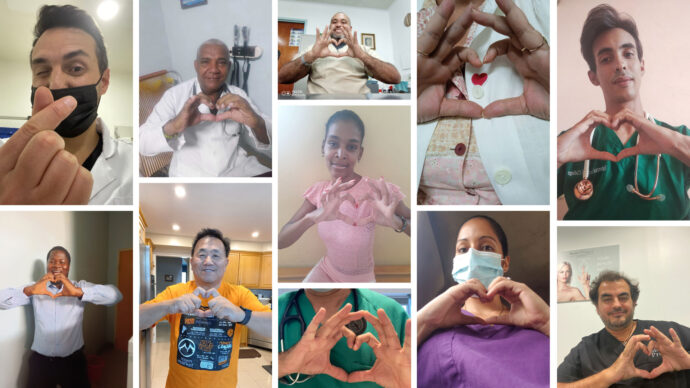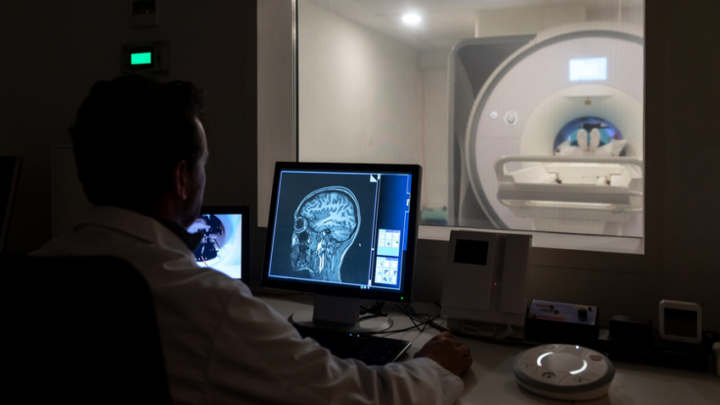
On Thursday, September 29, physicians from around the world honored and observed World Heart Day by sharing powerful pictures of their hands making a heart shape. They also discussed cardiovascular disease (CVD) and this year’s theme: “Use heart for every heart.”
According to the World Heart Federation, “World Heart Day is an opportunity for everyone to stop and consider how best to use ❤️ for humanity, for nature, and for you. Beating cardiovascular disease is something that matters to every beating heart.”
In a Sermo poll, 560+ global physicians weighed in on risk factors, Covid-19’s effect on CVD, and maintaining a healthy lifestyle and exercise routine. Here are some highlights:
Regarding CVD risk factors, below are the ones the physicians said most affect their patients:
- 65% said diabetes
- 62% said physical inactivity
- 61% said high cholesterol
- 50% said tobacco
- 19% said Covid-19
When it comes to maintaining a heart healthy diet, the following habits are the hardest for their patients to follow:
- 60% said limiting unhealthy fats
- 53% said portion control
- 48% said not enough fruits and vegetables
- 43% said reducing salt
- 39% said making fresh food instead of processed
- 28% said choosing Low-fat protein sources
- 25% said not enough whole grains
When asked what types of exercise the physicians prefer, here’s what they said:
- 42% walking/hiking
- 28% running/jogging
- 9% cardio workout or class
- 8% swimming
- 6% biking (indoor or out)
- 5% weight training
- 3% yoga
Here are the types of exercises their patients tend to choose:
- 61% walking/hiking
- 33% running/jogging
- 17% cardio workout or class
- 16% swimming
- 15% biking (indoor or out)
- 10% weight training
- 10% yoga
When it comes to exercising, 84% said their patients understand how effective it is for maintaining a healthy heart. And 77% said their younger patients exercise more than their older patients.
When asked about the frequency of their own exercise routine, here’s how often the physicians are working out:
- 23% said 5 or 6 times a week
- 22% said 3 times a week
- 20% said every day
- 17% said 4 times a week
- 9% said 2 times a week
- 5% said once a week
- 4% said never
82% of the physicians have seen increased morbidity in CVD patients due to Covid-19.
81% are continuing to see a lasting impact on heart health due to the pandemic.
75% are seeing more and more younger patients with heart problems and CVD.
Below, Sermo physicians from around the world share more of their professional insights, perspectives, and opinions on this important topic—in their own words:
“The most significant CVD risk factor that I see in patients is diobesity. This a combined condition of obesity and type 2 diabetes which potentially is preventable. The condition has become an epidemic which is now world wide. It is particularly prevalent however in the U.S. What makes it even worse is that starting in the 1990s diabetes and obesity has increased dramatically in children and adolescents. The causes are multifactoral including poor nutrition, decreased physical activity and genetic predisposition. Because of the pandemic there has been a significant decrease in physical activity in the past few years. Though the ability to participate in physical activities such as going to a gym or being involved in outdoor sport pursuits has improved, the overall impact has not been beneficial. The main point though is that the risk factors of obesity and diabetes can be treated and are potentially reversable. Considering the epidemic proportions and serious risk for CVD along with other conditions including OSA, kidney disease, fatty liver disease and cancer it is imperative, that the condition of diobesity be addressed from both ends, first by preventive measures and otherwise by treatment, diet and exercise when the condition has already developed.”
Internal Medicine, U.S.
“The most popular disease in the causes of cardiovascular disease is COVID. especially during the covid period, sedentary life, eating of ready-made food and the effects of covid on the cardiovascular system.”
Emergency Medicine, Turkey
“I consider that in food the most difficult thing is the abuse of carbohydrates more than any other food.”
Family Medicine, Venezuela
“I think stress is a major risk factor that’s often underestimated by us and the pandemic made it worse. The other risk factors still there and play a major role too.”
General Practitioner, U.S.
“Diabetes, Physical inactivity and use of less Prudent diet are leading factors of CVD. In Pandemic Covid 19 also has decreased immunity, that’s why morality rate has increased in CVD patients due to affected immune response.” —G.P., Pakistan
General Practitioner, Pakistan
“I arm myself 5 to 6 times a week. I try to make each of my patients understand how important the benefit of exercise is, however very few comply with it. In truth, it seems to me that it comes more from an internal motivation, an inherent desire of the person to start an exercise.”
General Practitioner, Venezuela
“Obesity is the most common risk factor for my patients. It’s getting worse in pandemic.”
Internal Medicine, U.S.
“To achieve good health it is very important to keep our heart in optimal condition and it can be in various ways, exercise frequently, walks or short runs, cycling among others but with this we can also lose weight and eradicate sedentary lifestyle, it becomes more effective if we have a healthy diet without fats, or much carbohydrates, especially eating a lot of salad, there is a saying that says, “green is good” to eat, it refers to vegetables. If we already have some pathology, say hypertension or heart disease, then It is necessary to add to all this healthy lifestyle an adequate compliance with the therapy imposed by the doctor. I take this opportunity to congratulate my Cardiologist colleagues.”
Intensive Care, Cuba
“No one wants to cook for themselves anymore. Frequent Fast food = Fast Death.”
Dermatology, U.S.
“CVD is multi factorial in cause, but can be prevented. Routine blood work and doctor visits (annual exams), healthy food choices including avoiding processed foods and cutting down on sugar and sodium, drinking more water, exercise, and healthy living. Maintaining a healthy weight and managing stress.
Of course, if one is hypertensive and/or diabetic the responsibility for self care increases. Preventative care is ideal.”
Family Medicine, Cuba
“Poverty from losing ppl and jobs from covid; new technologies to adopt; stress; bad quality of food; uncertainty for the future; misinformation from the gov and press are still causing heart deaths in younger ppl. Many cardiologists have died too.”
Neurology, Greece
“I recommend the systematic practice of physical exercises 5 to 6 days a week and no less than 30 min. The types of exercises I recommend depending on the comorbidities of the patients.”
General Practitioner, Cuba
“In my specialty it has been a challenge to show the cardiac complications that some pediatric patients develop and whose effects can persist over time.“
Pediatrics, Venezuela
Everyday thousands of Sermo member physicians from diverse backgrounds and experiences exchange knowledge with each other. Sermo is the original medical social network that empowers today’s physicians. Over 1 million fully verified physicians across more than 150 countries come to our platform to talk with peers, participate in paid medical studies, solve challenging patient cases, contribute to the world’s largest database of drug ratings – and enjoy a few laughs along the way.
Interested in more? Check back any time and follow us on Facebook, Twitter, and LinkedIn for the latest and greatest in physician insights.
Are you a physician or healthcare practitioner?
Explore the many benefits of joining Sermo’s medical community and sign up for free today.














